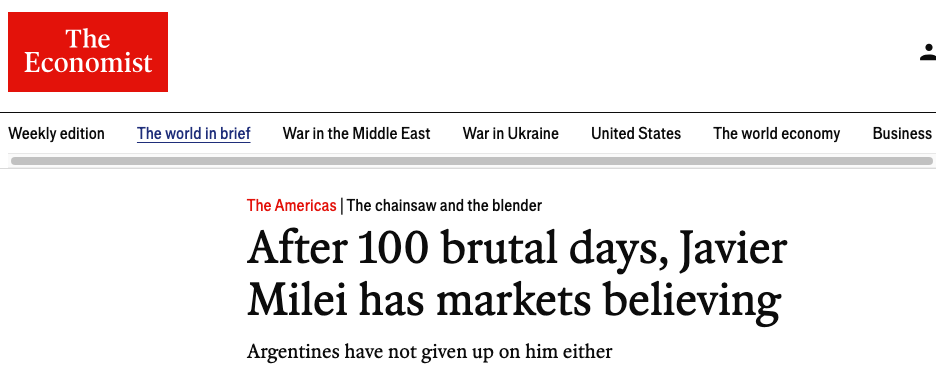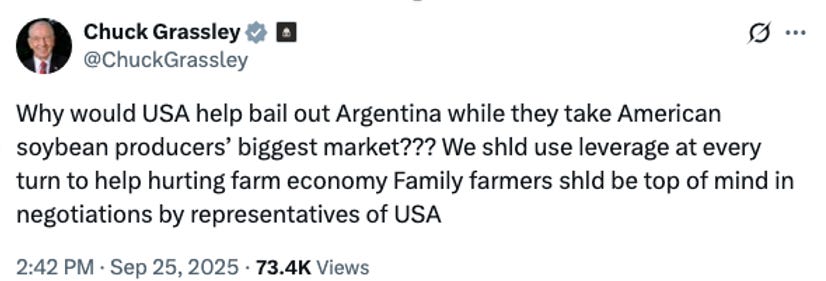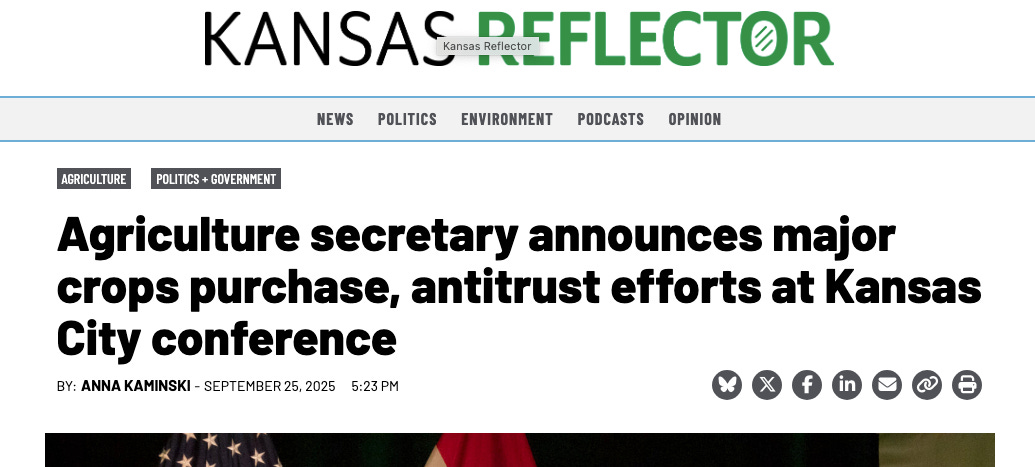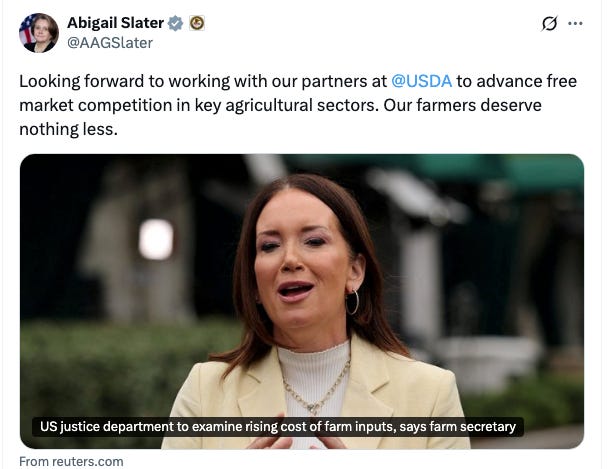Monopoly Round-Up: U.S. Farmers Revolt Over Trump's Argentina BailoutThe White House, facing angry farmers over a bailout of their competitors in Argentina, is trying to offer favors. Like cracking down on agri-business. Plus cringe shutdown politics, and more.Lots of monopoly news as usual. A government shutdown is looming, Jimmy Kimmel is back on the air as big media caves to public pressure, Democrats are coming out for redoing the Telecom Act, and even conservatives are opposed to certain media mergers for their own reasons. I’ll have a full round-up after the paywall. First I want to highlight a few stories from this past week showing that the Trump political coalition is weakening, and one method Trump is using to save it is to promise more assertive antitrust. It starts with Trump’s controversial and odd $20 billion potential bail out of Argentina and its libertarian leader, Javier Milei. On Monday, Treasury Secretary Scott Bessent said a “large and forceful” intervention in financial markets was on the table to help the beleaguered nation, sparking a big rally in Argentine bonds. Why would Trump risk so much for what looks like a random nation? Well in part it’s ideological. “Tonight, we recognize President Javier Milei for his tireless efforts to Make Argentina Great Again,” Bessent said on Wednesday. “We’re sending a message that, if you do the right thing, if you follow good policies, that if you’re aligned with the values of the United States . . . we are willing to provide assistance when things move out of equilibrium,” he put on social media. Partly, it’s ego, a desire to flip one of the single worst examples of global development. In the early 20th century, Argentina was one of the richest countries in the world, but after 100 years of politics characterized by the populist legacies of Juan and Eva Peron, and then the frequent turn to military coups, it is now poor. It is a regular recipient of loans from the International Monetary Fund, and it defaults on obligations to international investors as a political choice. In 2023, Milei, a weird-looking libertarian economist, was elected President, and pledged to break the cycle. He was perfectly in sync with the MAGA movement, aligning with Elon Musk on shutting down government departments, pontificating on Lex Fridman’s podcast, and building connections within Trump-world. “The world will soon be talking about growth at Argentine rates,” he bragged in April. Senators who opposed his plans, he said when taking office, were “enemies of society.” Aside from cutting the welfare state, Milei also eliminated capital controls, meaning that wealthy Argentinians could send their money out of the country. Importantly, the Argentine currency is pegged to the dollar, and Milei didn’t sever that link, because doing so would have a significant cost for the wealthy. It wasn’t just MAGA world that Milei seduced, but Wall Street and the economics intelligentsia. Investors poured into the nation’s bonds, including Fidelity Investments, T. Rowe Price Group Inc. and Pimco, as well as various hedge funds. The Economist, led by libertarian editor-in-chief Zanny Minton Beddoes, regularly published fawning profiles of Milei’s reforms, noting how he had brought down inflation, cut the “bloated” government, and slashed pensions, while retaining his popularity. And a whole set of conservative validators held up Milei’s libertarian political views as something to replicate in their nations. In January, even good news seemed to emanate from Argentina, Trump was forcing a set of international development institutions - the IMF, the World Bank, and the Inter-American Development Bank - to collectively lend the country $42 billion, on top of the existing $41 billion it already owed. Milei was borrowing dollars, and rich Argentinians and foreign investors were taking those dollars straight out of the country. But then came the unraveling. In early September, Milei’s faction lost an important local election over corruption scandals and a sour populace, a prelude to the possible collapse of his political power and the reversal of his financial policies. Investors panicked, and sold off Argentine assets, leading to the beginnings of a financial crisis. So Scott Bessent stepped in, and is now directly putting the U.S. government behind Milei’s government, saying America will do “whatever it takes” to save that regime and the hedge funds who have invested in it. As one would expect, Democrats were not happy. Senator Elizabeth Warren immediately called out Bessent for helping Trump give “away our money to his corrupt buddies;” Bessent responded by accusing her of attempting to “rival the failed leftist agenda of the Argentine opposition.” More Democrats, like former CFPB director Rohit Chopra, are pointing out the folly of the bailout as well. But the politics here are trickier than you’d expect for Trump. Argentina competes with America in something that is politically very sensitive: soybean production. U.S. soybean farmers are already in a lot of trouble, as they are having significant problems accessing the Chinese market due to trade disputes. Instead, the Chinese are buying soybeans from… Argentina, which just got rid of its export tax so it can export even more of the crop to China, displacing U.S. farmers. After hearing news of the bailout, farmers lost it. Here’s American Soybean Association President Caleb Ragland letting the administration have it.
Republican politicians representing farmers are also upset. “This is a bitter pill for North Dakota soybean farmers to swallow,” U.S. Rep. Julie Fedorchak (R-N.D.) said. And Iowa Senator Chuck Grassley expressed open frustration: In other words, the real problem for Trump is that this bailout pits two very loyal constituencies against each other, hedge funds and soybean farmers. The context makes the situation worse. Much of the agricultural economy is in a significant slowdown after three years of declining prices since a commodity peak in 2022. That’s not true for cattle, eggs, and hogs, but for crops like corn, cotton, soybeans, wheat, and fruits/vegetables, revenue has gone down and crop input costs have gone up. 62% of ag economists think “row crops” are in recession. It’s not a farm crisis like the 1980s, more like a significant pay cut, which people don’t like. Rural America is beginning to get angry at Trump over his dealings with China and now Argentina. But interestingly, they are also starting to point fingers at agri-business monopolies, since farmer revenues are declining, but farmer costs aren’t. The National Corn Growers, for instance, started an input-cost task force. More dramatically, earlier this month, 400 farmers packed a meeting with field representatives from Sen. Tom Cotton, Sen. John Boozman and Rep. Rick Crawford, and sounded off. Here’s Arkansas farmer Adam Chappell, who grows rice, soybean, and corn, after the meeting.
Farmers are perpetual complainers, so while things are getting worse, the downturn isn’t that bad yet. But it could get much worse, and the Argentine bailout put a fine point on which parts of his coalition Trump values most. And that brings me to the other set of announcements out this week, in which Trump sought to mollify his frustrated farmer base. Trump said he wants to use tariff revenue to bail out farmers. That’s possible, but it could require Democrats in Congress to go along. Trump is also bragging about new international trade deals, though China is conspicuously absent, and he is trying to bring down interest rates, which will help farmers, who have around a half a trillion dollars of debt in aggregate. But none of that really solves the problem of higher costs for physical inputs and lower prices for what they sell. Crop inputs are monopolized across the board, to the point where farmers are increasingly just a pass-through for agri-business. There was some modest action during the last administration; the FTC under Lina Khan brought a monopolization case against seed/chemical firms Corteva and Syngenta in 2022, which passed key legal hurdles but has yet to go to trial. The Antitrust Division helped restructure important parts of the poultry farming market and launched a broader investigative mandate. The USDA under Biden had a few modest successes. But mostly, the patent thickets, tying and monopolization are still in place. So the dramatic announcement of action by Slater and Rollins is fascinating. It’s an attack on a third pillar of the Trump coalition, which is agri-business monopolies. But there are reasons to be skeptical it will amount to much. While investigations are happening, it takes awhile to put together a case and litigate it, so even if they can act, it’s not going to impact the markets for years. Also, the Antitrust Division (and FTC) are bleeding qualified staff, which means the quality of the cases they do bring could be weak. Finally, even if Slater and Rollins could get the ball rolling, they have opponents within the administration and in Congress. For instance, under Biden, the USDA had started sending money and personnel to states to help them bring antitrust cases in the agricultural space. This week, the USDA quietly killed that program. And DOGE nearly shut down the key Chicago Antitrust Division office focused on agriculture. I suspect Congressional Republicans will not be particularly excited to strengthen laws against agri-business, though it could be timely if a politician demanded Trump use tariff money to finance more agricultural antitrust work. The bottom line is that the viability of the Trump coalition is being severely tested. And the fact that Trump is being forced to actually put effort into antitrust in the agricultural space is not a small deal. Republicans writ large may despise Khan, but they are still being forced to do her bidding, even when they don’t want to. So there we go. And now, on to the rest of the round-up after the paywall. There are lots of great stories, such as a heated debate on Wall Street over whether there’s an AI bubble, the beginnings of Democratic political leaders talking about rewriting the Telecom Act of 1996, the Trump FTC failing again with a settlement against Amazon, and the number of private antitrust cases exploding. Read on for more useful and awkward information about market power... Continue reading this post for free in the Substack app |









